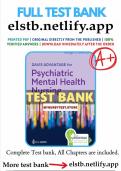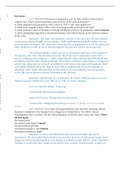,DOWNLOAD THE Test Bank for Davis Advantage for Psychiatric
Townsend
Health Nursing 10th Edition
PMHN,
10e
Chapter 2. Mental Health and Mental Illness: Historical and Theoretical Concepts
MULTIPLE CHOICE
1. A nurse is assessing a client who is experiencing occasional feelings of sadness
because of the recent death of a beloved pet. The client’s appetite, sleep patterns, and
daily routine have not changed. The nurse determines the client’s behaviors:
1. Demonstrate typical variations in daily mood, not mental illness
2. Are clinically significant and indicate serious mental illness
3. Are incongruent with cultural norms and indicate mental illness
4. Show common symptoms of grief and do not indicate mental illness
ANS: 4
Chapter: Chapter 2, Mental Health and Mental Illness: Historical and Theoretical
Concepts
Objective: Describe psychological adaptation responses to stress.
Page: 20
Heading: Grief
Integrated Processes: Nursing Process: Assessment
Client Need: Psychosocial Integrity
Cognitive Level: Analysis [Analyzing]
Concept: Grief and Loss
Difficulty: Moderate
Feedback
1. This is incorrect. Feelings of sadness are not a typical aspect of daily mood
variations.
2. This is incorrect. These symptoms are not clinically significant from the
perspective of mental illness. The client demonstrates a common grief
response.
3. This is incorrect. Feelings of sadness are expected and normal following the
loss of a pet. The client does not exhibit signs of mental illness, as daily
functioning is not impaired.
4. This is correct. Feelings of sadness are expected and normal following the lossof a
pet. This client does not demonstrate changes in daily function but does demonstrate
common symptoms of grief.
CON: Grief and Loss
2. Which indicates a client is likely demonstrating a mental disorder?
mynursytest.store
,DOWNLOAD THE Test Bank for Davis Advantage for Psychiatric
Townsend
Health Nursing 10th Edition
PMHN,
10e
1. The client expresses mild anxiety and is eating more than usual
before an examination.
2. The client displays an inability to concentrate, including reduced job performance.
3. The client describes engaging in fidgeting behavior consistently over a few days.
4. The client states an increase in smoking over a few days from 0.5 to 1 pack perday.
ANS: 2
Chapter: Chapter 2, Mental Health and Mental Illness: Historical and Theoretical
Concepts
Objective: Define mental health and mental illness.
Page: 14
Heading: Mental Illness
Integrated Processes: Nursing Process: Assessment
Client Need: Psychosocial Integrity
Cognitive Level: Application [Applying]
Concept: Stress
Difficulty: Moderate
Feedback
1. This is incorrect. The client is expressing normal behaviors related to mild
anxiety appropriate to a situation, in this case an examination. Mild anxiety
can be beneficial to improve performance.
2. This is correct. The client is unable to concentrate, and job performance has
been negatively impacted. This demonstrates a possible mental disorder.
3. This is incorrect. Fidgeting behavior over a short-term period is a common
psychological adaptive response to mild anxiety. This does not suggest a
mental disorder.
4. This is incorrect. Smoking or increasing smoking over a few days is a common
response to stress and suggests mild anxiety, which does not suggest a mental
disorder.
CON: Stress
3. A mental health nurse is speaking with parents who are concerned about their
teenage children’s responses to stress. One child becomes anxious and irritable and
the other
withdraws and cries. Which is the nurse’s best response?
1. “Individual responses to stress are affected by many factors and can vary.”
2. “Children from the same family should not react so differently to stress.”
3. “Children should have similar dispositions and responses to stress.”
4. “Environmental factors influence stress responses more than genetic factors.”
ANS: 1
Chapter: Chapter 2, Mental Health and Mental Illness: Historical and Theoretical
Concepts
mynursytest.store
, DOWNLOAD THE Test Bank for Davis Advantage for Psychiatric
Townsend
Health Nursing 10th Edition
PMHN,
10e
Objective: Describe psychological adaptation responses to stress.
Page: 16
Heading: Psychological Adaptation to Stress
Integrated Processes: Nursing Process:
Implementation Client Need: Teaching and
Learning
Cognitive Level: Application [Applying]
Concept: Stress
Difficulty: Moderate
Feedback
1. This is correct. Responses to stress are variable among individuals and may be
influenced by perception, past experiences, environmental factors, and genetic
factors.
2. This is incorrect. Responses to stress vary among individuals; even those within
the same family will have different stress responses.
3. This is incorrect. Children, like adults, will demonstrate various responses to
stress, depending on factors such as environment, past experiences, and
perceptions.
4. This is incorrect. Responses to stress depend on genetic factors, perception, past
experiences, and environmental factors.
CON: Stress
4. The nurse is interviewing a client with a history of excessive drinking and multiple
arrests for impaired driving. The client states, “I work hard to providefor my
family. I don’t see why I can’t drink to relax.” Which defense mechanism is the
client demonstrating?
1. Projection
2. Rationalization
3. Regression
4. Sublimation
ANS: 2
Chapter: Chapter 2, Mental Health and Mental Illness: Historical and Theoretical
Concepts
Objective: Correlate adaptive and maladaptive responses to the mental health and
mental illness continuum.
Page: 16
Heading: Anxiety > Behavioral Adaptation Responses to Anxiety > Table 2–2,
Ego Defense Mechanisms
Integrated Processes: Nursing Process: Assessment
Client Need: Psychosocial Integrity
Cognitive Level: Comprehension [Understanding]
Concept: Addiction and Behaviors
Difficulty: Easy
mynursytest.store





